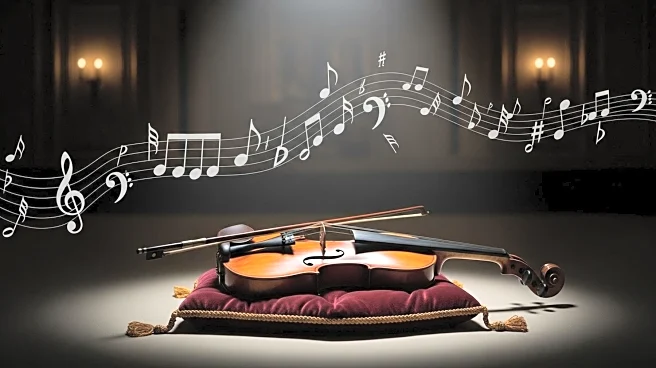What's Happening?
Dr. Paul Wingfield, a composer and director of studies in music at Trinity College, Cambridge, has authenticated a violin once owned by Albert Einstein. The discovery was made after Wingfield wrote a musical drama titled 'Einstein's Violin,' inspired by his late brother-in-law, Joseph Schwartz. The drama premiered in Highgate, north London, in April 2025. Following a performance, Wingfield was contacted by an auctioneer seeking verification of a violin believed to have belonged to Einstein. Through extensive research into Einstein's musical life, Wingfield confirmed the violin's authenticity, noting unique features such as the inscription 'Lina,' which Einstein used for all his violins, and the violin's slightly longer body suited to Einstein's larger left hand.
Why It's Important?
The authentication of Einstein's violin is significant as it highlights the intersection of music and science, showcasing Einstein's lesser-known passion for music. The violin's sale at auction for £860,000, far exceeding its expected value, underscores the cultural and historical value attributed to items associated with prominent figures like Einstein. This event also reflects the meticulous process of verifying historical artifacts, which can lead to substantial financial and cultural gains. Collectors and historians stand to benefit from such discoveries, as they provide deeper insights into the personal lives of influential individuals.
What's Next?
The successful authentication and sale of Einstein's violin may encourage further exploration and verification of other historical artifacts linked to famous figures. Auction houses and collectors might increase efforts to uncover and authenticate items with significant historical provenance, potentially leading to more high-profile sales. Additionally, the story of Einstein's violin could inspire similar artistic endeavors that blend historical research with creative expression, fostering a greater appreciation for the cultural contributions of historical figures.
Beyond the Headlines
The authentication process undertaken by Dr. Wingfield highlights the importance of interdisciplinary expertise in verifying historical artifacts. His background in music and research into Einstein's life provided unique insights that were crucial in confirming the violin's authenticity. This case exemplifies how personal connections and academic research can lead to significant cultural discoveries, emphasizing the value of preserving and studying historical artifacts.









